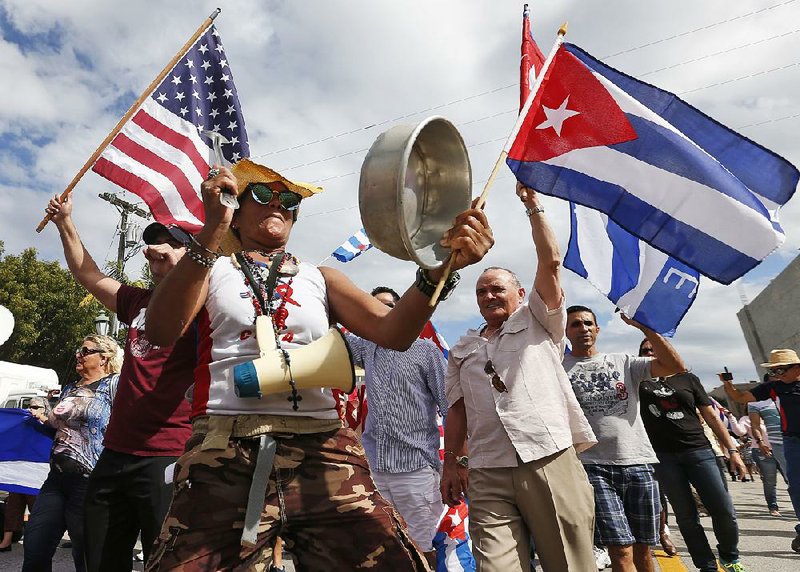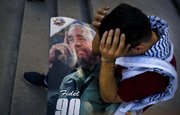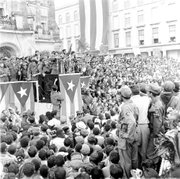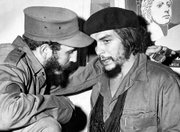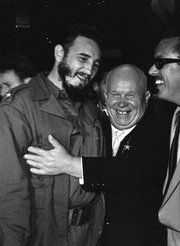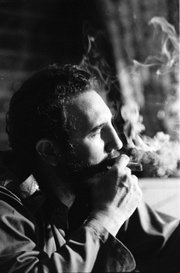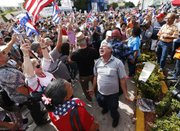Cuban-Americans took to the streets Saturday morning in Miami as news spread that Fidel Castro, the father of the Cuban revolution and a man who prompted many to flee the island, leaving behind homes and family members, had died overnight at 90.
RELATED ARTICLES
http://www.arkansas…">Good riddance, say some Arkansans; others see openinghttp://www.arkansas…">Trump, Obama say U.S. will reach out to Cubans
http://www.arkansas…">Raul seen as the more adaptable Castro brother
While the Cuban capital of Havana remained eerily quiet after the announcement of Castro's death on state media, hundreds in Miami's Little Havana gathered on a stretch of Eighth Street, banging pots and pans and dancing. Cars rolled slowly through the streets, with their occupants honking and waving Cuban and American flags. Other celebrations were seen in Cuban-American neighborhoods of cities like Hialeah in Miami-Dade County.
"I wish my dad was here to see this," cried 27-year-old Abraham Quintero. Wearing an "I love Hialeah" T-shirt, he stood on West 49th Street and Ludlam Road, where police quickly set up watch posts to make sure impromptu revelers stayed safe.
Castro, who led his bearded rebels to victorious revolution in 1959, embraced Soviet-style communism and defied the power of 10 U.S. presidents during his half-century of rule in Cuba.
Members of Miami's burgeoning Venezuelan community joined in Saturday's celebration. Many consider themselves kindred spirits of the Cubans, having fled a place that the late Hugo Chavez imagined in Cuba's image.
"The tyrant is finally gone. The suffering has come to an end," said Guillermo Ramon, 67, who traveled to Miami 26 years ago from Cuba. He predicted that Castro's death will hasten the demise of the regime run by Fidel Castro's brother Raul.
Castro's death comes at a time when the future for the U.S. relationship with Cuba is uncertain. President Barack Obama visited the island earlier this year and promised to ease sanctions that had been in place since the early years of the Cold War, but the presidential victory of Donald Trump and his running mate Mike Pence has left many wondering whether the detente will last.
In Miami, Mayor Tomas Regalado said in a statement: "For 57 years Fidel Castro has been the symbol of tyranny and oppression of our people. I call on the Obama administration and the Trump administration to demand real changes from the Cuban regime, on behalf of many Cubans who have died in the U.S. and in Cuba waiting for this day and for freedom."
Eighth Street closed to traffic, from Southwest 35th to 37th avenues, to accommodate the elated crowds gathered at Versailles Cuban restaurant, an iconic exile hangout, where people cheered and waved signs.
Some yelled profanities about Castro, and slogans that translated to: "Fidel, tyrant, take your brother" and "Raul, tyrant, go with your brother."
Someone outside the restaurant had a portable karaoke system, and the crowd sang Cuban star Willy Chirino's exile anthem, which translates to "Our day is coming." The scent of burning Cuban cigars lingered.
Young and old yelled for what translated to "Liberty."
People were still popping champagne bottles in the middle of the street after 4 a.m. Saturday in an expression of jubilation that remained peaceful.
"I don't think we've made any arrests and don't expect to have any violence due to this long-awaited day," Miami police officer Rene Pimentel said.
Trump won in Florida voting, thanks in part to support from Cuban-Americans who are critical of the regime they left behind.
In Little Havana, Trump-Pence signs could be seen in the crowd Saturday morning. Trump tweeted: "Fidel Castro is dead!" to his 16 million followers. Later, in a statement, the president-elect said the "tragedies, death and pain" caused by Castro couldn't be erased, but that his administration will do "all it can to ensure the Cuban people can finally begin their journey toward prosperity and liberty."
"There's a lot of reason to think that finally things will change in Cuba," said Angel Ali Gonzalez, a 32-year-old security guard, who was born in Miami to parents who immigrated in 1969.
On Miami's Eighth Street, Gonzalez waved a "Trump-Pence: Make America Great Again" sign and wore one of the campaign's signature baseball caps. Although polls show signs of change in political views among many younger members of the community, Cuban-Americans have been an electoral bulwark for the Republican Party in Florida for decades.
During his visit to Havana in March, Obama said Cubans had essentially created Miami as it currently exists. The bilingual Spanish-English community in south Florida has earned a reputation as the de facto capital of Latin America, drawing waves of immigrants from countries including Argentina, Brazil and Venezuela, and becoming a place where Latin American tycoons invest and enjoy their money.
Many immigrants originally from Cuba, and their children, have gone on to play important roles in American politics, while others -- like billionaire real estate developer Jorge Perez -- have helped shape the Miami skyline.
Olivia Carlos, 29, immigrated with her parents from Cuba when she was 10. She joined the U.S. Navy and eventually returned to the island when she was stationed for a year at Guantanamo Bay. For her, Castro has long been a part of her tangled personal narrative.
"This is a very emotional day for me, and I hope this means there's light at the end of the tunnel," she said. "Maybe there's hope that things will finally change in Cuba."
In the Cuban capital, flags flew at half-staff at public buildings and some foreign embassies across the city Saturday. By midday, the U.S. Embassy's flag had not been lowered.
Carlos Rodriguez, 15, was sitting in Havana's Miramar neighborhood when he heard that Castro had died.
"Fidel? Fidel?" he said, slapping his head in shock. "That's not what I was expecting. One always thought that he would last forever. It doesn't seem true."
"It's a tragedy," said 22-year-old nurse Dayan Montalvo. "We all grew up with him. I feel really hurt by the news that we just heard."
President Raul Castro, in a shaking voice, announced on state television that his older brother died at 10:29 p.m. Friday. He ended the announcement by shouting the revolutionary slogan: "Toward victory, always!"
Cuba's government said Cubans will observe nine days of mourning and that Castro's ashes would be interred Dec. 4 in the eastern city of Santiago, a birthplace of his revolution. The country will hold more than a week of honors, including a nearly nationwide caravan retracing, in reverse, his tour from Santiago to Havana with the triumph of the revolution in 1959.
World's condolences
The revolutionary leader's passing prompted expressions of respect in other parts of the world and measured responses from governments that saw the devoted socialist as a threat.
Obama noted that while "discord and profound political disagreements" marked the relationship between the United States and Cuba for nearly six decades, Americans were extending "a hand of friendship to the Cuban people" during their time of grief.
"History will record and judge the enormous impact of this singular figure on the people and world around him," Obama said.
In a statement issued by Trump's transition team, Trump called Fidel Castro a "brutal dictator" who had oppressed his own people for decades and left a legacy of "firing squads, theft, unimaginable suffering, poverty and the denial of fundamental human rights."
Elsewhere in the world, Castro was honored and mourned by many present and former national leaders.
In a telegram to 85-year-old Raul Castro, Pope Francis offered "my sense of grief to your excellency and family."
Francis broke from the Vatican's usual practice of having the secretary of state send official condolences. In a mark of the esteem that the pope held for Castro, whom he met during a visit to Cuba last year, Francis signed the telegram himself.
Russian President Vladimir Putin, whose country was Cuba's main ally and supporter during the Soviet era, called Castro "a sincere and reliable friend of Russia" who had built "an inspiring example for many countries and nations."
United Nations Secretary-General Ban Ki-moon said he had vivid memories of meeting Castro in January 2014 and having "a lively discussion that covered developments around the world as well as sustainable development and climate change."
"Under former President Castro, Cuba made advances in the fields of education, literacy and health," Ban said. "I hope Cuba will continue to advance on a path of reform and greater prosperity."
The Nelson Mandela Foundation, established to carry on the work of the late anti-apartheid leader who would go on to become South Africa's president, recounted the close relationship Mandela forged with the Cuban leader.
When Mandela became president in 1994, he was criticized by some in the West for his ties to Castro. Mandela replied that anyone who objected could "jump in the pool."
"The first country we approached [for assistance in battling apartheid] was the United States of America. We could not even succeed to come close to the government, and they refused to assist us," Mandela said in a 1990 documentary to explain his loyalty to Castro. "But Cuba, the moment we appealed for assistance they were ready to do so and they did so."
Castro's death was felt especially keenly in Latin America, where his success in overthrowing a military regime inspired leftist activists in other countries.
Salvador Sanchez Ceren, the president of El Salvador, said he felt "deep sorrow ... of my friend and eternal companion, Commander Fidel Castro Ruz."
Mexican President Enrique Pena Nieto tweeted that "Fidel Castro was a friend of Mexico, promoting bilateral relations based on respect, dialogue and solidarity."
Venezuelan President Nicolas Maduro recalled Castro's departure from Mexico on the yacht Granma with his brother Raul and several dozen supporters to start their revolution.
"Sixty years after the Granma sailed from Mexico, Fidel sails toward the immortality of all those who fight their whole lives," Maduro tweeted. "Onward to victory, always!"
Information for this article was contributed by Jonathan Levin and Michael Smith of Bloomberg News; by Anita Snow, Rhonda Shafner and staff members of The Associated Press; and by Julie Hirschfield Davis of The New York Times.
A Section on 11/27/2016

